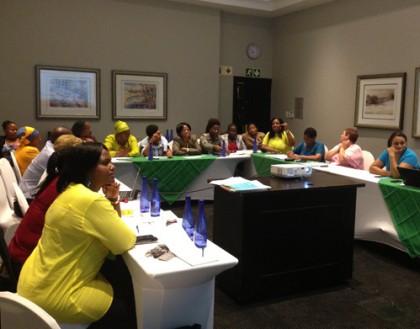I-TECH South Africa is using Standardized Patients to measure the quality of care for sexually transmitted infections (STIs) for an operations research (OR) study in the Northwest Province. Ten South African actors, five men and five women, will visit 40 clinics before a new STI training program and at two time periods after the training.
Category: Countries
Record Numbers for India Online Seminar
I-TECH India set a new attendance record for its twice-monthly online learning series on HIV/AIDS.
The “Nutritional Aspects in HIV infected Children” lecture—part of the National Distance Learning Seminar Series (NDLS)—was attended by 342 participants from across the country, including all 10 Centres of Excellence (CoEs ) and 71 ART Centres.
The lecture was presented by Dr. Pushphalatha, Professor of Pediatrics, Bowring CoE Bangalore. The last record was 285 participants for Dr. Rewari’s sessio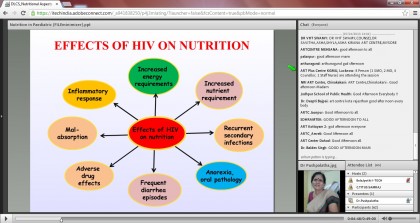 n on National ART Guidelines in 2012.
n on National ART Guidelines in 2012.
The series is aimed at health care workers and physicians working with HIV/AIDS patients. National experts present on variety of advanced care, comprehensive management, and treatment topics via live webcast sessions across several states and districts around the country. The goal is to create a dialogue amongst clinicians in regard to management of moderately complex cases. These 60-minute sessions are conducted in English and use a case-based format during the live session and allows participants to engage in follow-up communication across the sites.
I-TECH launched the Global Health Clinical Seminar Series (CSS) in July 2007. With the goal of improving the quality of HIV care delivered by health care workers in resource-limited settings, the series brought together expert clinicians and health care workers in a web-based, interactive format from around the world. India was the first country in the I-TECH network to use this model to design and implement their own series in 2010.
To support country programs in the global network, I-TECH developed The Global Health Webinar Series Program Package as a resource for organizations interested in creating a successful global health webinar series. Drawing from the experience of I-TECH’s Global Health Clinical Seminar Series (CSS), this program package offers critical tools for the planning, implementation, and evaluation of a webinar series in a variety of settings. The package also offers lessons learned and best practices by I-TECH’s CSS in the four years it was running.
I-TECH Lab Team Finding Success in Strengthening Ethiopia’s Labs
Four out of five of the I-TECH Ethiopia supported laboratories were the best performing among the 21 enrolled in the second phase of a program to test lab performance.
Malawi Bishop Promotes Male Circumcision
Right Reverend Bishop Emmanuel Fanuel Magangani of the Anglican Diocese of Northern Malawi is the first prominent church leader to announce that he was recently circumcised as part of the country’s efforts to promote Voluntary Medical Male Circumcision (VMMC).
Five Questions For Misti McDowell, I-TECH Ethiopia Country Director
Editor’s Note: This is a first in an occasional series featuring I-TECH staff.
Misti McDowell joined I-TECH Ethiopia in February, assuming leadership of I-TECH’s largest country program. In Ethiopia, I-TECH’s work is primarily in the Amhara, Afar, and Tigray regions, which account for nearly 50% of the national HIV burden. I-TECH is focused on strengthening the country’s public health systems, including hospitals and health centers, laboratories, public universities and medical schools. Prior to joining I-TECH, McDowell worked for five years in Dhaka, Bangladesh, for FHI360 where she oversaw projects on HIV/AIDS, nutrition, family planning, TB, hospital accreditation, and neglected tropical diseases.
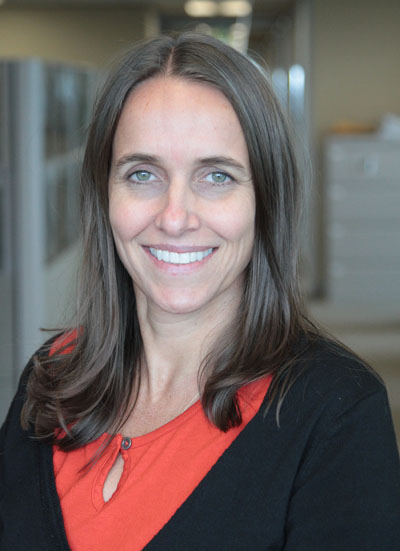 You just became the Country Director for I-TECH Ethiopia. What has been the biggest surprise in your first few weeks at I-TECH?
You just became the Country Director for I-TECH Ethiopia. What has been the biggest surprise in your first few weeks at I-TECH?
I wouldn’t say that it is a surprise, but I was very impressed with the quality of work that I-TECH has accomplished over the years in Ethiopia, especially around all the infrastructural upgrades to hospitals and universities, the capacity building and training to providers delivering quality HIV care, treatment to patients, and strengthening universities to deliver comprehensive pre-service and in-service training.
What will your primary focus be over the next 18 months?
My primary focus will be to diversify funds, build a stronger team, and improve morale. I think with a stronger team we can accomplish more than we already have and continue to make a greater impact in the health care system of Ethiopia.
Tell us about a leader who inspires you.
Dalai Lama: “If you think you are too small to make a different, try sleeping with a mosquito.”
You have brought your family to Ethiopia, including your husband and two young girls. What do your girls like best about their new life in Addis?
I think what my girls love best about Addis is the mountains and that they can go hiking and rock climbing.
What’s the most interesting challenge you think I-TECH’s programs are tackling in Ethiopia?
The transition of programs to the government with a quick timeline. I think the government of Ethiopia really wants to have everything transitioned; however with the planned timeline, it will be difficult to transition everything and maintain quality. There are many systems in the government that need to be streamlined to ensure sustainability and quality of the programs that are now being supported by NGOs and to change those systems will take a long time.
Malawi’s Nkhoma Hospital Launches Voluntary Medical Male Circumcision Program
Report by Pius Mtike
Lilongwe District’s Nkhoma Hospital has started offering Voluntary Medical Male Circumcision (VMMC) services.
VMMC services began with great enthusiasm: 37 procedures were performed in less than two weeks, according to Dr. Roderick Banda, Medical Officer at Nkhoma Hospital.
“We are encouraged by this overwhelming response,” Banda said.
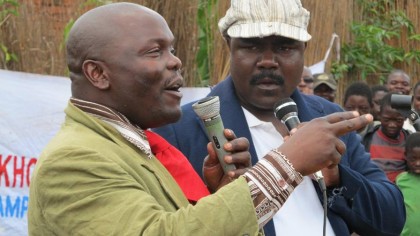 The project has taken a novel approach to recruiting participants by staging a two-week awareness campaign that incorporates comedy, music, and film. The group has engaged the services of popular local comedians Chindime and Samalani and the Health Education Band of the Ministry of Health. VMMC promotional film documentaries will also be shown.
The project has taken a novel approach to recruiting participants by staging a two-week awareness campaign that incorporates comedy, music, and film. The group has engaged the services of popular local comedians Chindime and Samalani and the Health Education Band of the Ministry of Health. VMMC promotional film documentaries will also be shown.
Local leaders are also getting in on the act. Encouraging his subjects following a VMMC promotional documentary, Group Village Headman (GVH) Chimwaye underscored the need to seriously consider VMMC, a one-time intervention scientifically proven to reduce the transmission of HIV by 60 percent.
“Now we have no reason to complain about long distance to town (VMMC Center in old town in Lilongwe),” he said. “VMMC services are within our own vicinity.”
The initiative is in partnership with Lilongwe District Office and Health Education Unit of the Ministry of Health (HEU), and the International Technology and Education Centers for Health (I-TECH) Malawi as part of a PEPFAR subgrant. It is intended to encourage more eligible men to access locally available VMMC services.
New Tuberculosis Facility in Ethiopia Unveiled
Report by Yonathan Alemu
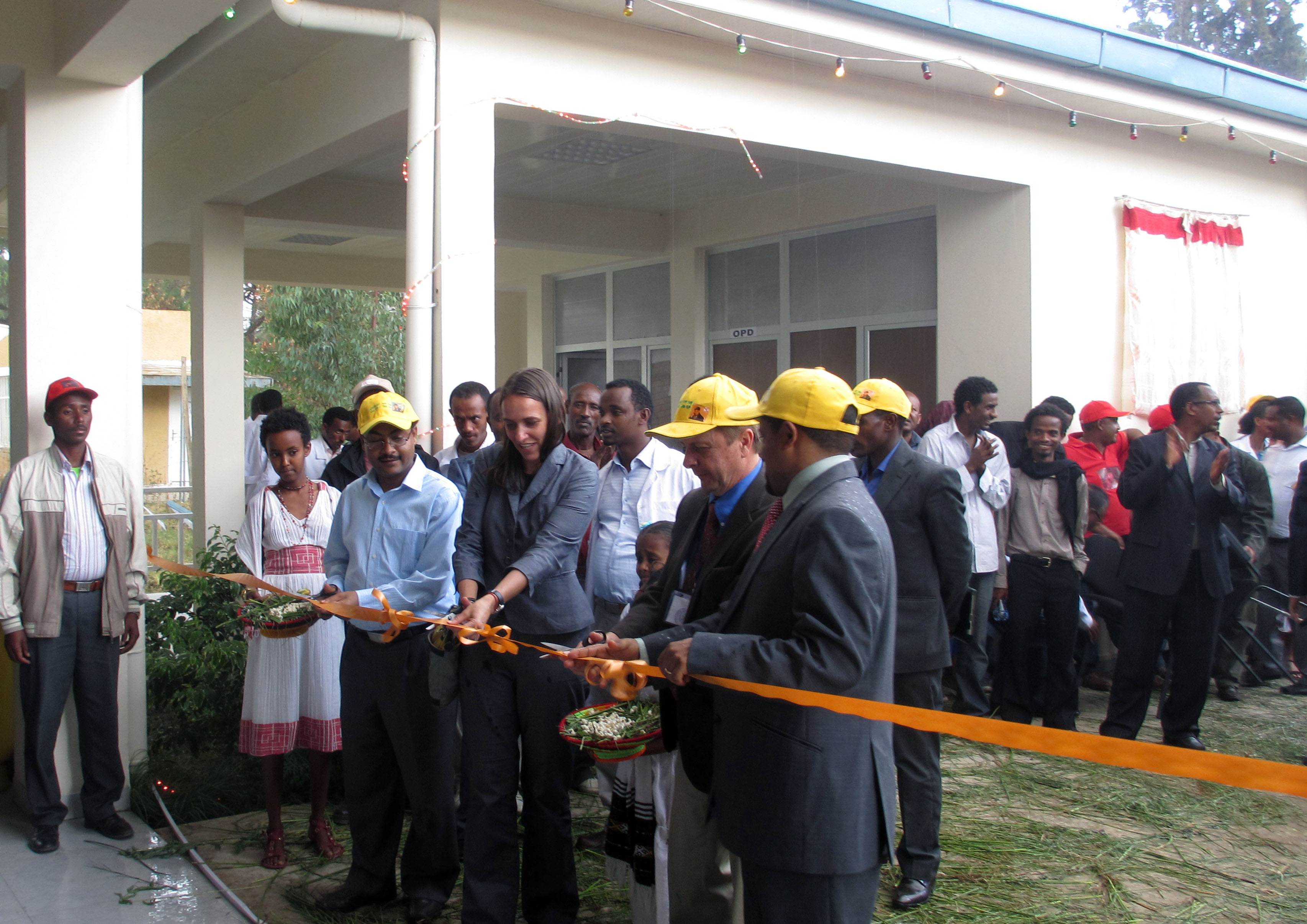 A state-of-the-art tuberculosis (TB) facility in Ethiopia is a new weapon in the country’s battle against the disease.
A state-of-the-art tuberculosis (TB) facility in Ethiopia is a new weapon in the country’s battle against the disease.
Located at the Mekelle Hospital in the Tigray region, the facility features a TB isolation ward with a multiple-drug resistant TB unit. The ward was constructed by International Training and Education Center for Health (I-TECH) Ethiopia with funding from the United States government. It is one of three such facilities in the country.
Resource-limited countries like Ethiopia struggle to address the growing demand for health care services. TB and MDR-TB are major public health problems with the highest mortality rate of any disease in the country. Ethiopia ranks seventh out of the 22 highest TB-burden countries. MDR-TB is a particularly threatening infection—it is difficult to diagnose without the proper technology. It is also difficult to treat, often requiring patients to stay on medication for two years.
The facility is in response to the urgency of implementing standardized TB prevention and the Federal Ministry of Health’s prioritized scale-up program.
The new TB facility enables the hospital—which had to refer such cases to the capital Addis Ababa—to separately treat TB and MDR-TB patients from other patients and thereby significantly reduce the risk of cross-infection. With a maximum capacity of 35 beds, the facility is able to provide scores of services, including first-rate TB case management, TB treatment, and support and community follow-up systems. It will also serve as a training center to help prevent and control the spread of TB in the region.
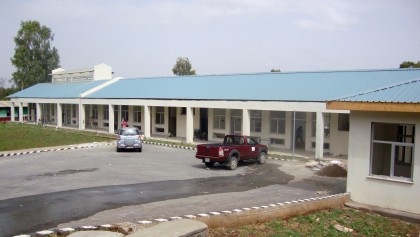 The facility was inaugurated on April 4, 2013. In a ribbon-cutting ceremony, I-TECH Ethiopia officially handed over the well-equipped and furnished facility. Dr. Kesete-Berhan Adamssu, Minister of Ministry of Health, acknowledged the support and strong commitment of CDC and I-TECH Ethiopia in their contribution to the country’s health system development endeavor. He emphasized that the facility will improve and expand TB diagnostic services and screening in rural areas and among HIV positive residents.
The facility was inaugurated on April 4, 2013. In a ribbon-cutting ceremony, I-TECH Ethiopia officially handed over the well-equipped and furnished facility. Dr. Kesete-Berhan Adamssu, Minister of Ministry of Health, acknowledged the support and strong commitment of CDC and I-TECH Ethiopia in their contribution to the country’s health system development endeavor. He emphasized that the facility will improve and expand TB diagnostic services and screening in rural areas and among HIV positive residents.
During the ceremony, a female patient sat quietly in a doorway at the far end of the ward, intently watching the program. Haimanot, (whose name is changed for this report) is in a segregated section of the ward, designed for patients with MDR-TB. She is a 22-year-old single mother of two admitted three weeks ago. She is in a very frail state as she has been living with the MDR-TB for a long time. “Besides, what is more worrying is the status of her two teens as they were living with her in a very small flat which allows them the cross-contamination,” said the TB nurse treating her.
The nurse said that Haimanot’s story is common, particularly in the rural areas of the region. Follow-up in communities with these cases is critical to preventing this deadly and quick-spreading infection.
For a hospital serving more than four million where TB infection is rampant, this facility will play a substantial role in the fight against tuberculosis. It could save countless lives through the scale up of MDR-TB diagnosis, management, and follow-up of patients.
Present at the transfer were several dignitaries and high-level officials, including H.E Dr. Keseteberhan Admassu, Minister of the Ministry of Health; H.E. Hagos Godefy, Tigray Region health bureau head; Dr. Thomas Kenyon, CDC Ethiopia Country Director; and Misti Mc.Dowell, I-TECH Ethiopia Country Director. Also present were representatives from the Mekelle University and regional health bureaus.
I-TECH South Africa Co-Hosts Third National Regional Training Centre Conference
Every biennium, the South African National Department of Health hosts a National Regional Training Center (RTC) Conference that brings together RTC managers, their line management, as well as key policy makers from the National and Provincial Departments of Health.This year I-TECH South Africa was honored to serve as a co-host.
This was the third national conference, and this year the theme was A Decade of Strengthening the Health Care System: Developing Human Resources for Health through the Regional Training Centers.
The popular conference registered 137 delegates out of the expected 120. Public health experts delivered compelling talks, whose topics ranged from leadership and management to innovative ways of delivering training.
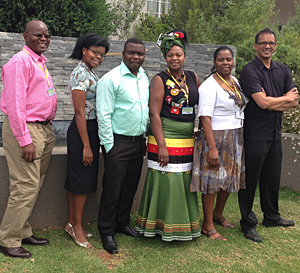
I-TECH South Africa presented a talk on The Findings of the Situational Analysis in Nine Regional Training Centres of South Africa, as well as a report on Regional Training Center Models, which was authored by Dr Nathan Linsk, a professor at the Jane Addams College of Social Work at the University of Illinois at Chicago, who drew on his 25 years experience with the US AIDS Education and Training Centers network. Both of these reports contributed significantly to the subsequent three days of discussion about the future of Regional Training Centers in South Africa.
During the conference, delegates were divided into five commission that looked at:
- Future role (Coordination of all in-service training; Institutional Base, Location, Funding model)
- Resources for RTCs (Human, IT, Internet connectivity, Equipment, Infrastructure etc.)
- Training and Education Approach (Mentoring, distance learning and Resource Library)
- Coordination, Accreditation and linkages with academic institutions (levels of accreditation, certification etc.)
- Planning, M & E, Reporting (Training needs analysis, integrated planning, M & E systems)
RTC managers took the worksheets from the 5 Commissions and developed an action plan, which was presented by the National Department of Health in a plenary session. As part of the next steps, I-TECH South Africa and NDOH will write a Conference report that will contain the action plan and a monitoring and evaluation plan as attachments. The NDOH will present the action plan to the National Health Council, made up of the National and Provincial Ministers of Health, for high level decisions and support toward the implementation of the proposed model.
Ethiopia: New Regional Lab in Afar Launched
Report by Yonathan Alemu, I-TECH Ethiopia
A new regional referral health and research laboratory in Afar regional state, in Semera was inaugurated on February 9, 2013. The regional laboratory was renovated and established by I-TECH through partnership with the Ethiopian Health and Nutrition Research Institute (EHNRI) and collaboration with the Afar Regional Health Bureau and funded by the U.S. President’s Emergency Plan for AIDS Relief (PEPFAR) through the United States Centers for Disease Control and Prevention (CDC).
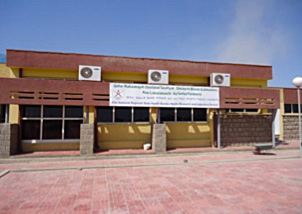
The new regional health facility, which is well equipped with advanced laboratory diagnostic technologies, was handed over to the Regional State with eventful program that brought together high level officials from the Federal Ministry of Health, the Afar regional state, the EHNRI, Afar regional health bureau and I-TECH Ethiopia leadership team.
The Afar regional Health Bureau Head, and the EHNRI regional laboratory capacity building directorate, Director addressed the impacts of partnership/collaboration to the improvement of the health system in the country in general and in the Afar region in particular and also applauded the I-TECH-Ethiopia’s significant contribution in strengthening the laboratory system in the Afar region.
The health facilities in the Afar region were small in number and were not well developed to provide standard and quality laboratory diagnosis services for the highly prevalent and deadliest diseases, but this is now changing following the intensified national health system strengthening programs in the country.
Dr. Nega G/yesus, the acting country Director of I-TECH Ethiopia acknowledged the long years of collaboration and partnership efforts put up by partners and the regional health bureau for all the successes achieved and appreciated the unwavering support of the United States Government in the health sector development in Ethiopia.
This new regional referral health laboratory will be a center to systematically build capacities of laboratories in the region to improve, assure and maintain quality laboratory diagnostic services. Moreover, it strengthens the regional referral system that would significantly improve the diagnostic capacities of laboratories for such as, HIV/AIDS, Malaria, TB, STIs and other opportunistic and tropical diseases, playing an integral role in Ethiopia’s public health emergency response system.
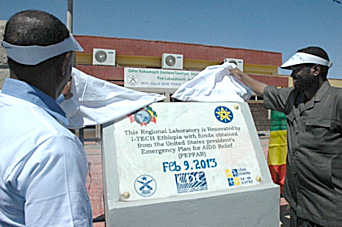 Dr. Wubshet Mamo, I-TECH Ethiopia’s Laboratory Program Director said, “The goal of the PEPFAR laboratory program is to support countries implement laboratory services in a sustainable manner to provide quality diagnostic tests, strengthen integrated laboratory systems and support and/or establish country or regional laboratory institutions. Establishing this modern laboratory, which is the 1st in the Afar regional state and the 9th regional referral health laboratory in the country will play a substantial role in changing the region’s laboratory diagnostic service quality, ensuring accurate and reliable laboratory test results that every patient deserves to get.”
Dr. Wubshet Mamo, I-TECH Ethiopia’s Laboratory Program Director said, “The goal of the PEPFAR laboratory program is to support countries implement laboratory services in a sustainable manner to provide quality diagnostic tests, strengthen integrated laboratory systems and support and/or establish country or regional laboratory institutions. Establishing this modern laboratory, which is the 1st in the Afar regional state and the 9th regional referral health laboratory in the country will play a substantial role in changing the region’s laboratory diagnostic service quality, ensuring accurate and reliable laboratory test results that every patient deserves to get.”
He further explained that the role of this regional laboratory primarily will be assuring the quality of laboratory services through conducting external quality assessment, providing referral testing services and strengthening the referral system, supporting in skill building of laboratory professionals, conducting disease surveillance and taking appropriate measures in case of emerging infections in the region. This laboratory will also be a hub for evidence-based interventions (operational health research). More importantly, supporting laboratories in the region to improve their laboratory quality system towards the WHO-AFRO step-wise laboratory accreditation will be another key role of this regional laboratory facility, said Dr Mamo.
The establishment of this Regional Referral Health Laboratory will have significant impact in building the capacities of the hospitals and health centers in the Afar region to provide standardized and quality laboratory services to the people in the region.
If there is one reason that shines the glowing happiness of the local leaders over the scorching sun during the event; it is the anticipated reduction in referrals to distant cities for a better laboratory diagnosis.
Ivoirian OpenELIS Software Developers Build Skills In Seattle
The weather has been rainy, and the midwinter days are short, but for two software developers from Côte D’Ivoire, four mid-winter weeks in Seattle offer a rare chance to develop skills under the close mentorship of University of Washington I-TECH experts.
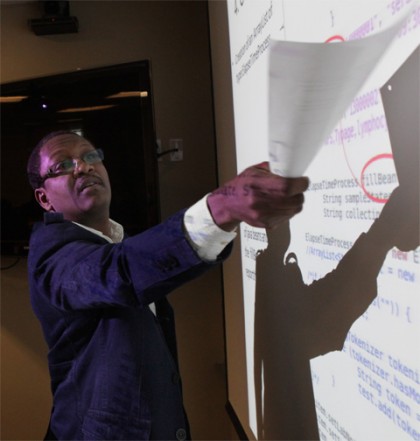
“There is no opportunity in Côte D’Ivoire to build software development skills like this,” said Dr Constant Kone on a recent afternoon as the grey Seattle rain pelted against the window of his borrowed office at I-TECH. His colleague Mr Kamalan Fourier, typing intently on his laptop across the table they share, nodded in agreement.
For several years, I-TECH has coordinated the implementation of the OpenELIS software in national public health laboratories in Côte D’Ivoire, an effort that is led by a highly skilled UW-based health informatics team. The open source laboratory informatics software was customized by the I-TECH team to match the workflow and local needs in Côte D’Ivoire.
But after the initial push to develop and install the software, there was a need for ongoing support, bug fixes, and additional features. “We get continual requests to add new features,” says Jen Antilla, a training specialist on the Seattle team, “for example to respond to new lab processes or build new reports that users need. And like any software, there will always be bugs to fix. We want to build the capacity to respond to those requests locally, in the labs where OpenELIS is running.”
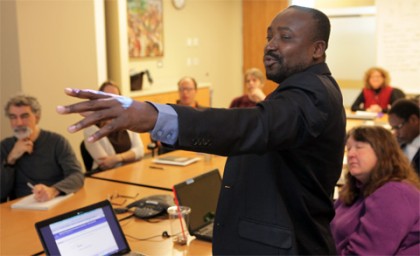
Like all I-TECH programs, the Côte D’Ivoire deployment of Open ELIS is on a trajectory towards local ownership and sustainability, but that path is made more complicated by the lack of skilled software developers in Côte D’Ivoire. I-TECH began recruiting for local software developers in April 2012, and recognizing that most applicants would require additional training, the team started designing a custom training course to build the Open ELIS development skills of the new hires in Côte D’Ivoire.
As the first trainees, Dr Kone and Mr Fourier are in Seattle for four weeks, which is the intensive first phase of a planned nine month training program that will continue remotely after they return home.
Central to the training is a problem-based curriculum developed by Antilla and her colleagues, which moves the learners through a typical software development cycle: gathering requirements, designing the solution, developing it into the Open ELIS codebase, and testing it before implementation.
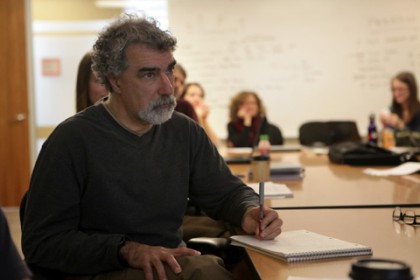
“It gives them the opportunity to learn about the different facets of Open ELIS as well as the tools and process needed to build a new feature,” says Antilla. “And to do so under the direct guidance of a mentor who’s spending lots of face-to-face time with them. When they return to Côte D’Ivoire they will continue with similar exercises a few hours each week, under a remote mentorship of our team, for the next 8 months.”
In the next few months Open ELIS will be fully implemented at a new site in Côte D’Ivoire, the lab at the Institut Pasteur. For the first time there will be local developers on-site with the skills to solve problems locally for their colleagues, with ever-decreasing support from Seattle.
And the I-TECH team in Seattle looks forward to having skilled colleagues at the point of deployment, sharing of the load.
“There’s nothing quite like having the opportunity to build a personal relationship over 4 weeks together in Seattle,” said Paul Schwartz, the senior software engineer on the Seattle team. “I look forward to working shoulder to shoulder with them after they return. Even when those shoulders are half a world away in West Africa!”
